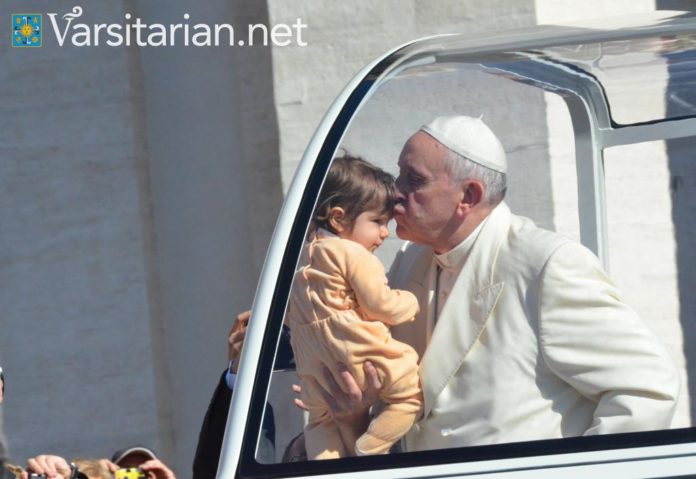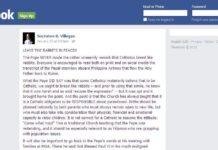DUBBED as the “People’s Pope,” Pope Francis has captured the hearts of many people for his charisma and simplicity.
Through his gestures conveying a message of humility and deep concern for the poor, Francis wants to reform the Church and draw back lost souls to the fold. But this is something Jorge Mario Bergoglio has done even before ascending to the See of Peter.
Childhood and clerical formation
Jorge Mario Bergoglio was born on Dec. 17, 1936 in Buenos Aires, Argentina. He is thus the first Pope from the Americas, or the New World.
His father, Mario Jose Francisco Bergoglio, was an accountant in the Bank of Italy in Turin while his mother devoted her life taking care of him and his four siblings.
After graduating as a chemical technician, Bergoglio entered the Diocesan Seminary of Villa Devoto to pursue a priestly vocation. On March 11, 1958, he joined the Society of Jesus. He graduated with a degree in philosophy from the Colegio de San Jose, San Miguel in 1963.
Bergoglio handled several academic and clerical positions. He taught literature and psychology at the Immaculate Concepcion College in Santa Fe from 1964 to 1965 and at the Colegio del Salvatore, Buenos Aires in 1966. In 1970, he obtained his degree in theology from the Colegio de San Jose.
He was ordained to the priesthood on Dec. 13, 1969. He was named titular bishop of Auca and auxiliary bishop of Buenos Aires by Pope St. John Paul II on May 20, 1992.
A few days later, Bergoglio received his episcopal ordination. He chose the phrase, “miserando atque eligendo” as his episcopal motto, which means “By Having Mercy and by Choosing Him.”
On Feb. 28, 1998, Bergoglio became archbishop of Buenos Aires. He was deeply loved by the people for his simple lifestyle and openness.
Bergoglio was not a fan of luxurious ways. In Buenos Aires, he was often be seen riding commuter trains and encouraging priests to be “ministers of mercy” rather than indulge in materialism.
He was created cardinal by Pope St. John Paul II on Feb. 21, 2001 and was given the Titular Church of San Roberto Bellarmino. Upon his appointment, the cardinal asked the faithful to donate to the poor instead of going to Rome to celebrate his creation as cardinal.
Argentinian missionary priest Fr. Luciano Felloni, who had Pope Francis as his confessor during his days as a seminarian, remembers the simplicity and wisdom of the present Pope.
“For three years, he was my neighbor, confessor and at the same time, I would attend recollections and talks given by him,” Fr. Felloni said in a phone interview with the Varsitarian.
Felloni added that Bergoglio used to remind his clergy all the time to be of service to the people.
“Bilang pari kailangan laging maglingkod sa tao. Ang pari ay hindi dapat laging nakakulong sa Simbahan, dapat laging umiikot at kailangang makihalubilo sa tao,” Felloni said.
Felloni, who is set to concelebrate Mass with the Pope at the Manila Cathedral on Jan. 16, hopes that Filipinos will not just focus on seeing the Pope, but listen intently to his message as well.
The People’s Pope
Elected as Pope on March 13, 2013, Bergoglio took the name “Francis,” after St. Francis of Assisi, among the many other things in which he was the first to do.
Pope Francis is also the first Jesuit Pope, having been ordained under the Society of Jesus, founded by St. Ignatius of Loyola. He is also the first pope to have been ordained priest after Vatican II.
Not a fan of limousines and big cars, the modest Pope still carries his own briefcase and continues to live at Casa Santa Marta, the Vatican residence for visiting clergy, instead of staying at the Papal Apartments in the Apostolic Palace.
Fr. Dave Clay, one of the concelebrants at the Manila Cathedral Mass with the Pope, describes Pope Francis as “very down to earth” and very different from the past popes.
“He wants to be close to the people,” Clay said. “I just want to tell him, ‘Thank you for being so human.’ He has changed so many people. He shows his love for everybody.”
Calling himself a “Son of the Church,” Pope Francis makes his stand clear on the moral issues of our time. However, he explains that the Church’s teachings should be applied with love.
As the Pope says, “We have to find a new balance; otherwise even the moral edifice of the church is likely to fall like a house of cards, losing the freshness and fragrance of the Gospel. The proposal of the Gospel must be more simple, profound, radiant. It is from this proposition that the moral consequences then flow.” April Joy E. Dy and Arianne F. Merez










